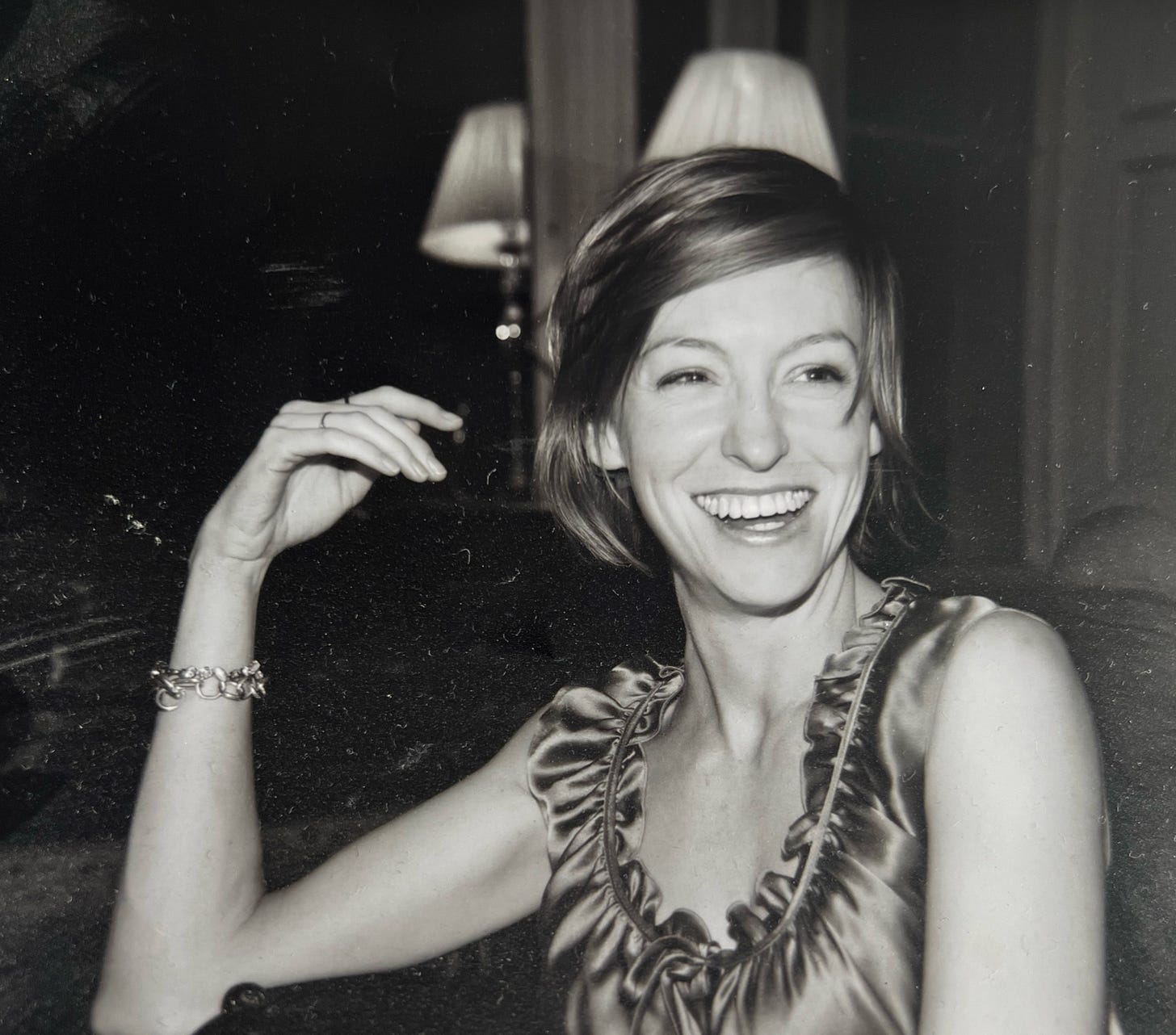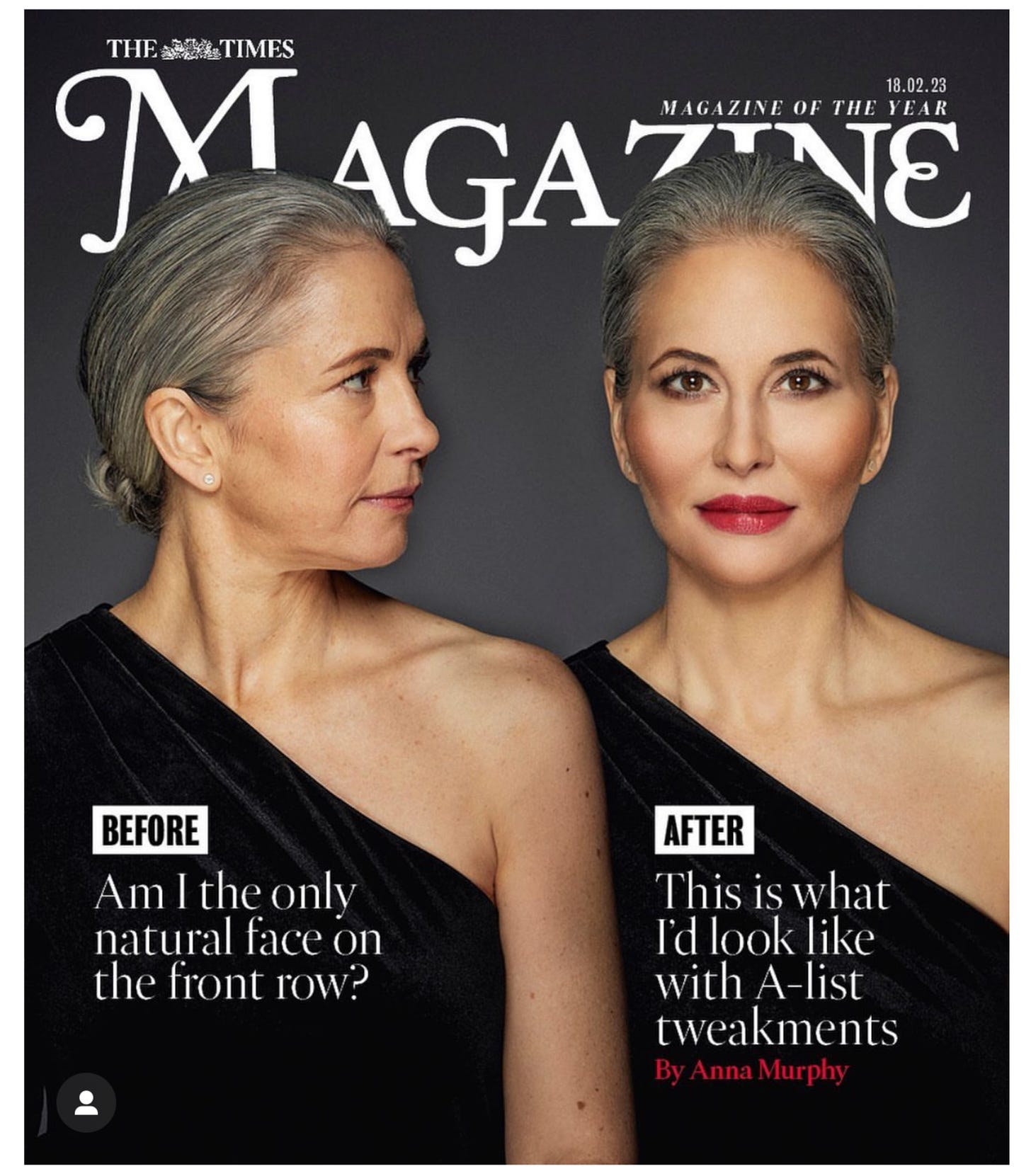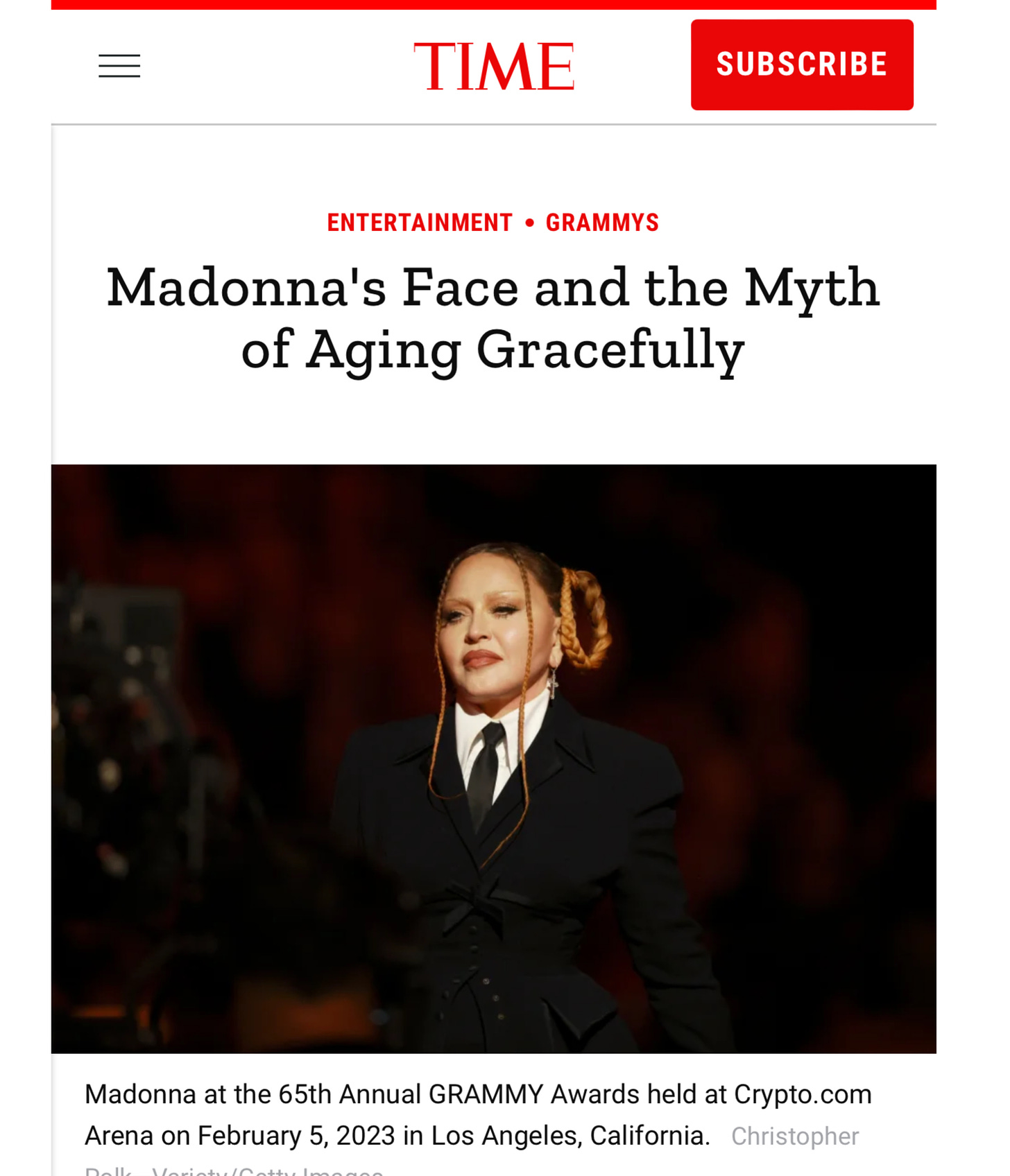Should I 'tweak' my real face away?
Thoughts on ageing, surgery and another plea for us to all to STFU with the judgements

This picture was taken 20 years ago. I was 33. At that age, a well known cosmetic surgeon and aesthetician invited me to his office for a consultation. I hadn’t been in the room for 30 seconds when he asked me why I would choose to walk around with the unsightly scar on my top lip when it could be smoothed out with a quick injection right there and then. It was the remnants of a dog bite, when I was 13, and I think it’s barely visible. This doctor noticed it straight away and was incredulous when I said, no, thanks, I’ll leave it. He went on to point out multiple flaws on my face that ‘needed’ correcting. A frown dent between my eyes, crinkly laugh lines at the corners of my eyes and mouth. I dare not visit him now, 20 years on, for fear the sight of me would probably give him a coronary.
Back then, invasive treatments to stave off signs of ageing hadn’t really become what they are now; that is, viewed as a routine baseline beauty treatment in the same vein as haircuts or manicures. But when the woman in this picture - who, I’ll grant you, ain’t no supermodel, but wouldn’t curdle the milk by looking at it either - was being told she urgently needed a face-full of needles, we were getting there. At pace.
At the same time I was the editor of a young women’s magazine and we felt compelled to discuss the rise in popularity of cosmetic intervention. Because whether we discussed them or not, they were becoming part of the landscape. I noticed a massive surge in classified ads for plastic surgeons in the magazine I edited, and every other one too. I was starting to read news reports about younger and younger women opting to surgically alter their faces and their bodies. Some celebrities openly discussed their regular needles and declared it empowering to be able to fix anything you want to about your face, as an act of self confidence. There seemed to be an overnight surge in the amount of new products that boasted ‘anti-ageing’ properties and their target markets were not just middle-aged women.
Beauty companies would tell me, gleefully, that younger women were becoming more interested in anti-ageing products, believing them to be an agent of prevention in the fight against the worst possible side effect of nature: looking older. And yes, magazines like the one I edited started to talk about ‘anti-ageing’ a lot. Our readers were really interested in the topic. But it was also true that if we weren’t discussing it and the relevant products, we’d be missing out on the massive advertising spend now being devoted to them.
And so, we, as a society, have become obsessed with fighting the visible signs of getting older. In this regard, I’m just like everybody else.
It’s only becoming braver to reject the whole phenomenon. The use of botox and fillers is so prevalent that to eschew it all is to risk forever being the oldest looking person in the room.
On the day I’m writing this, my friend Anna Murphy is on the cover of The Times Magazine discussing the obsession so many women (and increasingly men) have with cosmetically altering their faces: ‘tweakments’ we call them, the term so brilliantly pedalled by the aesthetic industry to cute-sify the injection of botulisms and other chemicals into our faces.
She feels increasingly like the outlier on fashion’s front row as more and more of her peers spend hours - and thousands - on looking smoothed, airbrushed. Alien at times, frankly. It often seems as though a lot of people do think that looking strange and other-wordly really is preferable to just looking your age.
I can’t say I’ve experienced overt ageism at work, but it hasn’t stopped me fearing it and raising the defence shields against it anyway. I know that my own dabblings with botox and fillers have been - at least in part - motivated by the worry that if I start looking distinctly middle-aged it may trigger subliminal questions. ‘Is she starting to look a bit, well…. tired? Past it?’ Currently I get to work in television - it’s occasional and peripheral, yes, but it doesn’t stop me being conscious of the fact that we’re always told that people don’t much like to see older female faces on camera.
And it’s hard to look in the mirror and see your face change. It must be a million times worse if you’re a celebrity or model when your livelihood, your entire identity, has been built on the foundations of a gorgeous - and youthful - face. When Love Island participants, barely out of their teens, are conforming to a beauty standard that celebrates a line-free, expressionless, plasticised look, it’s an epidemic that’s altering the psyche of every single one of us.
We’ve really entered a space now where you’re damned if you do and damned if you don’t. When Madonna was photographed at the Grammys recently, no one’s reaction covered them in glory. ‘What has she done to her face?!’ the world asked. It was asked with varying degrees of anger, derision, mockery or patronising concern. It’s a question I hear a lot, about many women. I read it in newspapers, news websites, on social media comments, in text conversations amongst friends and it never fails to trouble me.
In 2012, commentators were telling Madonna she was ‘too old’ to perform. In 2023, people are laughing when she’s taken steps to defy the visible signs of age. We’re addicted to scrutinising and judging the looks of everyone. When a person reacts to that judgement, we judge some more.
When a woman we’ve long celebrated for her unapologetic fearlessness has, on some level, succumbed to this pernicious message - ‘ageing = weak, irrelevant, shameful’ - what hope for any of us? How can I not feel I must look ‘too old’ if 23-year-olds are being urged that it’s never too early to start anti-ageing treatments? We live in a world where my daughter will probably find her first facial line at 27 and wonder if she should have it urgently eliminated. She will no doubt be encouraged by Influencers and possibly even good friends that this is something to ‘fix.’ This should depress and terrify us as much as eating disorders do.
I haven’t had anything done for over a year now. The last time I did, I ended up with a comedy, arched ‘villain eyebrow’ for a few weeks which was embarrassing, and not half alarming. Luckily my haircut hid it while I prayed it wasn’t permanent and my natural, sunken brow slowly returned. But truthfully, it hasn’t put me off and I think it’s likely I’ll go back for more. I like the slightly more awake version of me that is Botox’d me. I’m fond of joking that one day, when I deem it necessary, I’ll ask a surgeon to just start at my toes and drag all the skin from there up a few feet and just tie a big knot of excess flesh at the top of my scalp. ‘I’m going to be that friend who you all say, “God, what has she done to her face?”’ I tell my friends. I'm joking. I think. It’s easier to say you’ll never go mad with it when you’re still not actually looking old.
It’s my 53rd birthday this week. As I creep towards 60, will the urge to stave off lines and wrinkles just prove too great to resist? I wonder, if I’m surrounded by enough younger people turning themselves into real life Instagram filters, that those of us who don’t succumb will be the ones who look a bit strange? If these smoothed out, waxen faces are the new baseline beauty standard, is this destined to be the new normal, the new way to look human?
We don’t know the answers yet. This is a very live experiment we’ve subjected ourselves to. How the 20-somethings doing this to their faces will look - and how they’ll feel about how they look - is the future’s mystery to unveil.
But make no mistake, the answer to the question, ‘What has she done to her face?’ is this: She did what the world now apparently demands.








I find this whole topic disturbing. I live in the States and work for local government. As my colleagues put it, our pay is “dog shit.” No one I work with or regularly come in contact with has the the resources to tap into these anti-aging measures for the foreseeable future. My concern is that using these resources will become a marker of wealth, status, and hireability and will increase the stratification of society. I already feel that people see untouched faces and think, “Why is that person so tired/old/sad?” I think if we are not already there that the use of these tools will mark out who is even considered for higher positions and higher pay and even getting hired in whole industries.
I would absolutely use these and/or other measures if I had access to them. This isn’t an attack of them or people for using them. God knows we can all understand the allure. It just concerns me how gatekeeping increasingly, rapidly applies to our faces.
Very interesting piece. I was shocked when I first saw Love Island, the fact that teens are under the kind of pressure to start altering their faces before they've even finished growing or seeing what their adult face will look like is just so depressing. I think we just need to keep celebrating ageing and stop glorifying youth. That friend you posted for example, Anna Murphy, is so flipping beautiful!